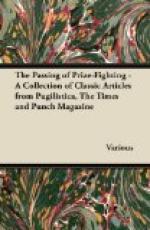* * * * *
WITH OR WITHOUT A MEDIUM.
“William Henry Gadd, said to have left Middlesex in 1812 for South America, or anyone acquainted with his whereabouts, will oblige by communicating at first opportunity with H.M. Consul-General, 25 de Mayo 611, this city.”—The Standard (Buenos Aires).
* * * * *
A correspondent informs us that the male gasworker is familiarly known as “Cokey,” and asks us whether the ladies who have recently entered the business ought to be described as “Cokettes.” We think it very probable.
* * * * *
[Illustration: British Officer (interrupting carousal in Bosch dug-out). “TIME, GENTLEMEN, PLEASE!”]
* * * * *
THE GOD-MAKERS.
The financial success of Mr. H.G. WELLS’ punctuality and enterprise in looking into the vexed question of the Deity, even in war time, has had the usual effect, and many literary men are feverishly pursuing similar studies. In due course some of these will no doubt take practical shape. Meanwhile it has seemed desirable for a Punch man to make a few inquiries among our leading philosophers and readers of the future with regard to the same engrossing topic. For England will ever be the wonder and despair of other nations in its capacity, no matter with what seriousness its hands are filled, for pursuing controversial distractions.
To run Mr. ARNOLD BENNETT to earth was no easy matter, for in these days he is behind every scene, and no statesman, however new, can get along without his counsel or correction. But, since to the good Punch man difficulties exist only as obstacles of which the circumvention acts as intellectual cocktails or stimuli, the task was accomplished. Mr. BENNETT agreed that the book of the other famous Essex fictionist was a meritorious and ingenious work, but he found it far from exhaustive. The idea of God, he held, still needed handling in a capable efficient way. What was wrong with religion was, he said, its mystery; if only it could be pruned of nonsense and made practical for the man in the street, it might become really useful. He personally had not yet thought finally on the subject of God, having just now more tasks on hand (including a new play and universal supervision) than he could count on the Five Fingers, but directly he had time he meant to attend to the matter and polish it off. It was a case where his intervention was clearly called for, since omniscience could be handled only by omniscience.
The Punch man has, however, to admit himself beaten in the matter of Sir OLIVER LODGE. On inquiring at Birmingham University he was told that the illustrious Principal was absent, no one knew where, but it was believed that he was visiting the higher slopes of Mount Sinai. All that the Punch man could obtain was one of the black velvet skull-caps which the seer wears, but, as it refused to give up any of its secrets, he must confess to failure—at any rate until Sir OLIVER returns.




